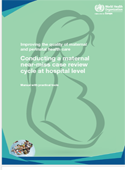Conducting a maternal near-miss case review cycle at hospital level (2016)

Download
Manual with practical tools
This manual is a practical tool developed by the WHO Collaborating Centre for Maternal and Child Health at the Institute for Maternal and Child Health, Istituto di Ricovero e Cura a Carattere Scientifico Burlo Garofolo, Trieste, Italy in close collaboration with the WHO Regional Office for Europe.
The manual describes the near-miss case review (NMCR) cycle as a type of “clinical audit” and is defined as “A continuous process to improve the quality of patient care and outcomes in facilities by systematic review of care against explicit criteria and implementation of changes”.
The quality of care is recognized as a crucial aspect in the WHO global strategies for ending preventable maternal mortality and in the “Every new¬born action plan”. Ensuring adequate quality of care is a primary objective of the European strategic framework “Health 2020” that sets the policy directions for the 53 Member States in the WHO European Region. Adequate quality of care is recognized as essential for the health and well-being of the population and also as a basic human right. Similarly, quality of care is in the center of the new “Action Plan for Sexual and Reproductive Health: towards achieving the 2030 Agenda for Sustainable Development in Europe – leaving no one behind” (2016) .
The NMCR manual focuses on one of the “Beyond the numbers” approaches: reviews of individual cases of maternal “near-misses” in facilities. It is based on previous manuals and definitions, the literature and lessons from the field over time in the European and other WHO regions and focused on:
- introducing the NMCR approach in a country,
- organizing an NMCR session in a hospital, and
- assuring the quality of the NMCR cycle
This manual is intended for hospital staff involved in maternal and newborn health care, for programme managers and policy-makers who are responsible for the quality of perinatal health care at ministries of health or in facilities, for the United Nations agencies and development partners that support maternal and newborn health care.
Further technical assistance will be provided by the WHO Regional Office for Europe, by the WHO experts as well as by the UNFPA in ensuring that NMCR when introduced is a tool for better quality of care and better maternal and newborn health.



